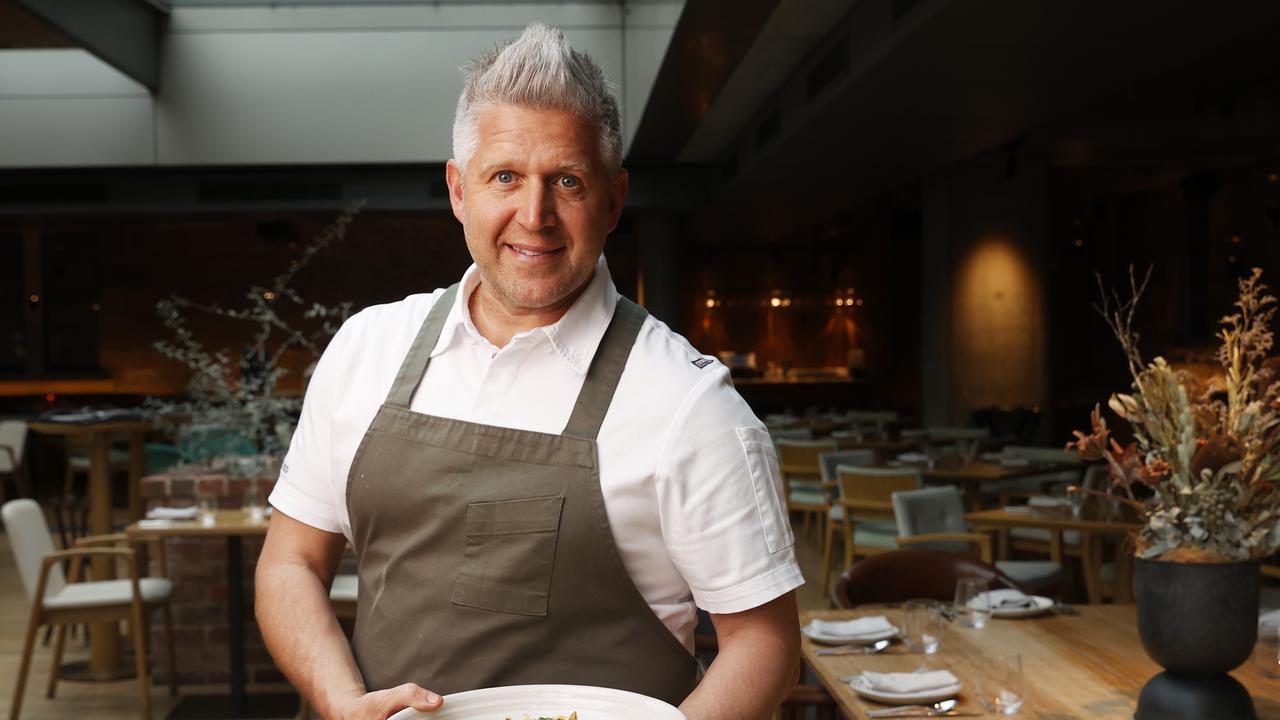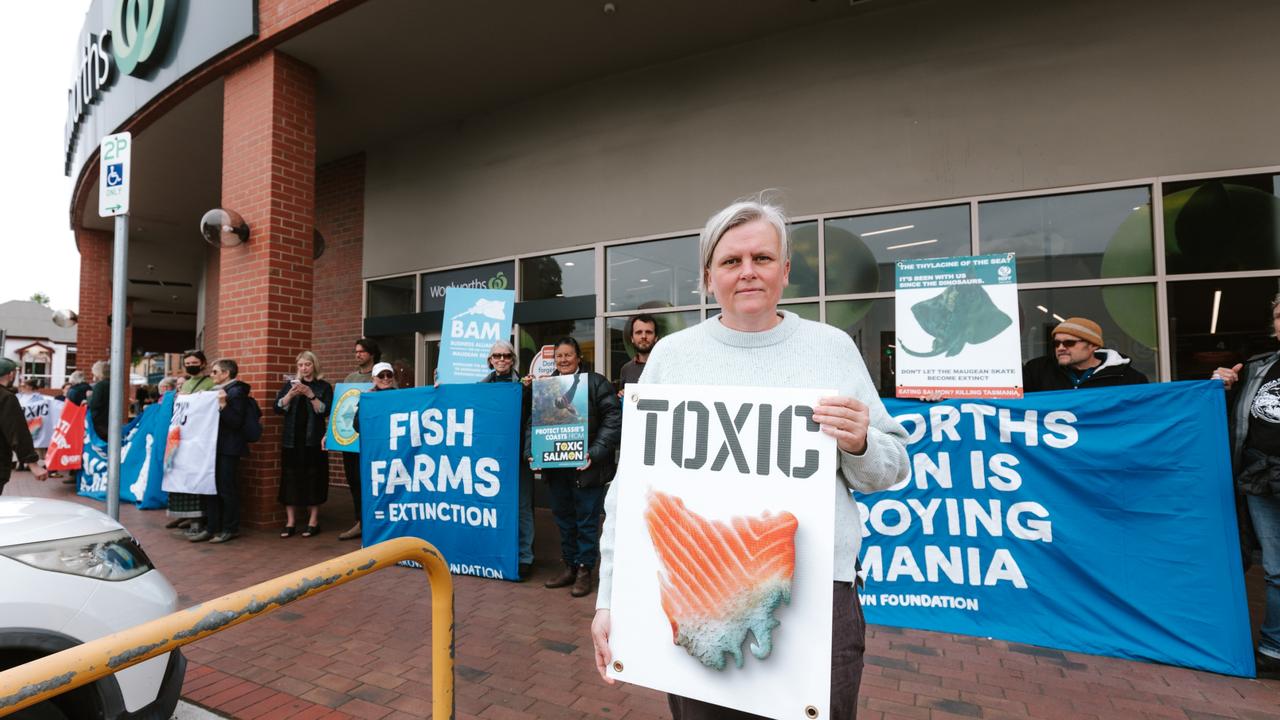Kirsha Kaechele planning future events after ‘raging success’ of Mona’s Forest Economics Congress
Mona’s Forest Economics Congress has been deemed a success by organiser Kirsha Kaechele, and she hopes it is the beginning of something special.
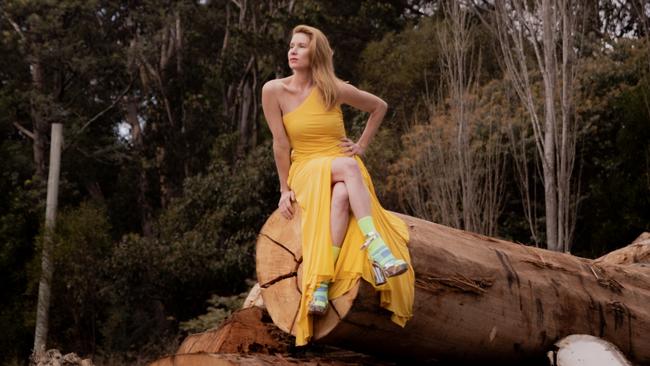
Tasmania
Don't miss out on the headlines from Tasmania. Followed categories will be added to My News.
Mona’s Kirsha Kaechele has described her three-day Forest Economics Congress as a “raging success” and hopes it will mark the beginning of a new spirit of collegiality and collaboration between loggers and environmentalists.
The event, which brought together representatives from both the forest industry and the conservation movement, was held at Mona from Tuesday until Thursday, and was attended by more than 100 delegates from all over the world.
It featured panel discussions, tree plantings, feasts, and merrymaking, with delegates split into 11 working groups, each delving into different topics pertaining to the value of Tasmania’s forests.
The groups presented the results of their – at times, uncomfortable – discussions at a summation session and closing ceremony on Thursday. The rest of the delegation was given the opportunity to cast their votes on different points of agreement and contention presented by the diverse groups.
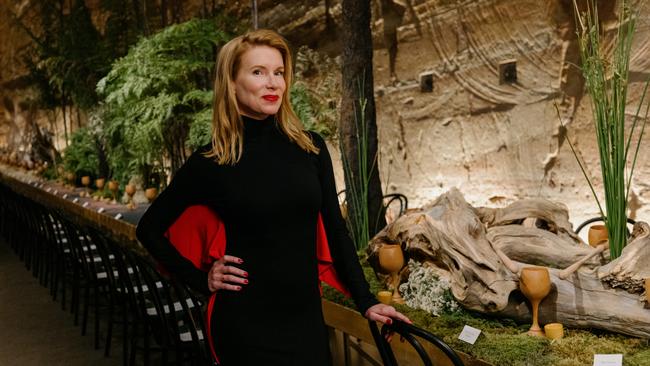
Ms Kaechele, an artist and curator, said she “couldn’t be happier” with how the congress had panned out and she hoped to organise further “working sessions” to be held as part of Mona Foma.
“I think the connection that was made is now a bridge. And it’s a seed for the next steps,” she told the Mercury.
“I think the art element, the creativity, the playfulness, or even the depth of emotion that an artwork can bring, helps people drop their guard and move on to business.”
Ms Kaechele, who is married to Mona owner and founder David Walsh, said one of the highlights of the event was the presentation of a First Nations-led approach to native forest management.
A number of Tasmanian politicians attended the final day of the congress, including Labor’s Ella Haddad, Liberal MLC Jane Howlett, independent MP David O’Byrne, and Greens leader Rosalie Woodruff.
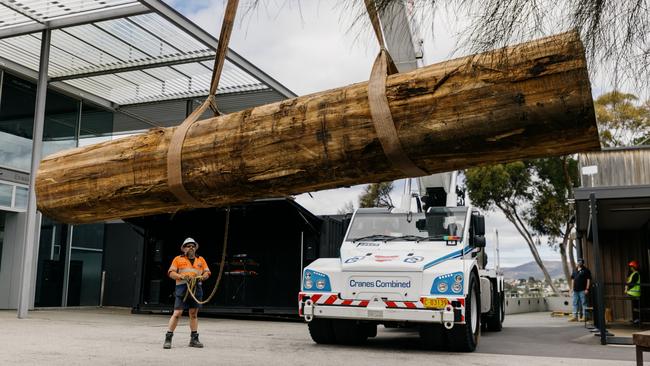
Resources Minister Felix Ellis was invited but opted not to attend, issuing a statement on Thursday criticising activists at the congress for supposedly heckling industry representatives.
“The congress had the potential to host important and robust conversations about our sustainable forestry industry,” he said.
“Instead, hardworking Tasmanians have endured heckling and abuse – this is totally unacceptable.”
Ms Kaechele disputed Mr Ellis’s characterisation of the event, saying he “would have had a completely different experience” if he had been there in person.
“There were so many uncomfortable moments but people behaved so well, they were good to each other, they behaved like adults, they listened to things that they absolutely disagreed with,” she said.
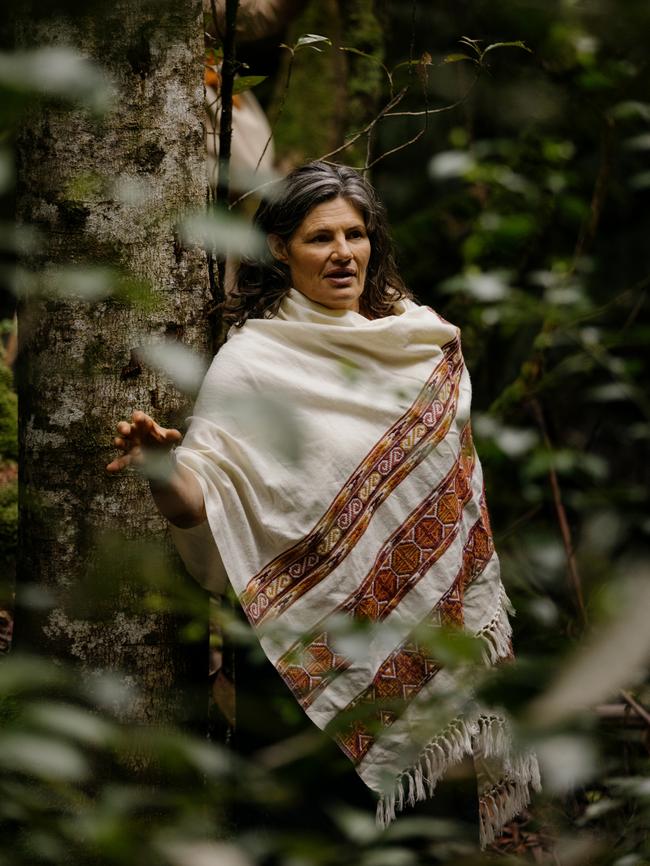
Bob Brown Foundation campaign manager Jenny Weber, who was among the delegates at the congress, said she was “thankful” that she had been in the room for the discussions and was grateful to Ms Kaechele for organising the event.
However, Ms Weber was disappointed that the congress was “very industry-dominated”.
“We were talking about monetising carbon in the forests, logging native forests, and I don’t think a Forest Economics Congress needed to be void of the ecology and climate facts,” she said.
Conservationists who attended the congress published a communique on Friday, calling on the state and federal governments to end native forest logging in Tasmania and to hand back native forests to Tasmanian Aboriginal people.
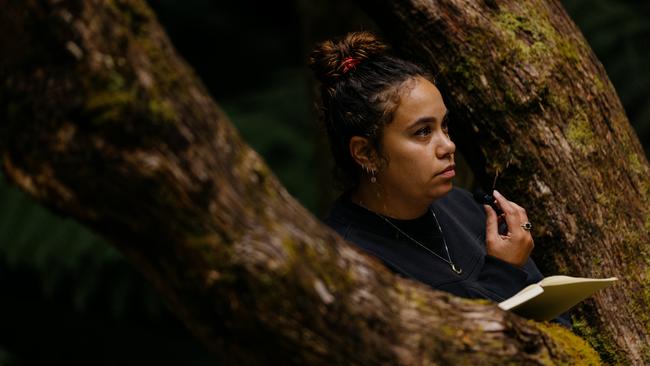
Tasmanian Forest Products Association CEO Nick Steel, who was also a delegate, said the congress was “brave” and “confronting” but that some of the behaviour from “certain attendees” was “over the top”.
“Overall there are some outcomes that could be explored further, but the main outcome was that conservationists, environmentalists, economists, academics, scientists and industry can, when pushed, come together on controversial topics and talk,” he said.
Why Kirsha is bringing bitter enemies together for forestry summit
November 26, 10:30am
When American-born artist and curator Kirsha Kaechele moved to Tasmania in 2010, she was immediately captivated by its majestic forests, seeing irresistible creative opportunities in the towering trees.
Kaechele, who is married to Mona owner and founder David Walsh, says she was so moved by the Tasmanian wilderness that she announced to a roomful of people her intention to curate an art exhibition deep within the forest.
“As soon as I suggested that, the room went silent – this was at a peak moment in the forest wars – and everyone explained that you can’t just have an exhibition in the forest now. It’s going to mean something, it’s going to mean one thing or another, and that I would encounter a lot of difficulty with people and their very charged emotions,” she tells the Sunday Tasmanian.
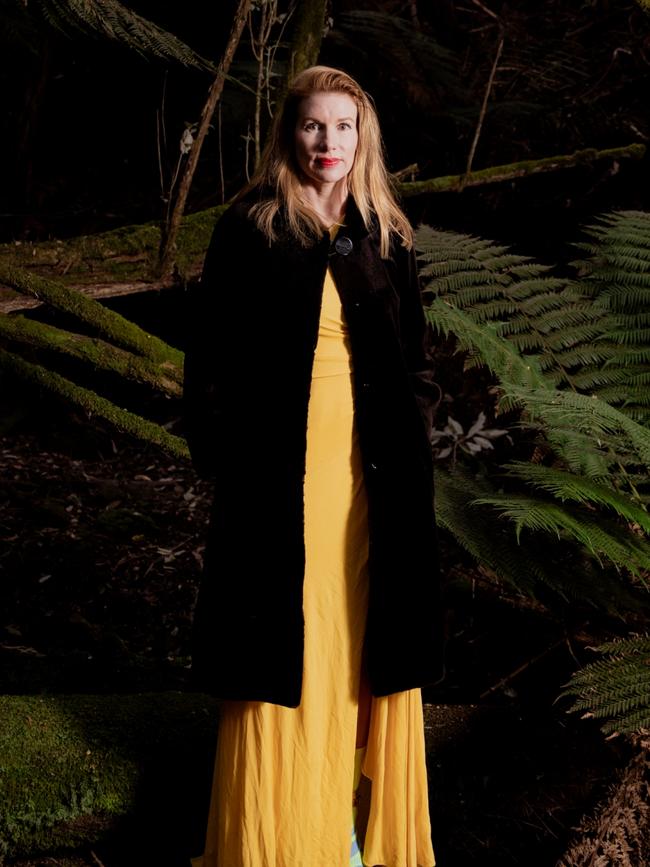
While she may not have gone ahead with the exhibition, 13 years later, Kaechele, is no less taken with the trees.
She is particularly interested in the idea of valuing Tasmania’s forests, believing this to be a potential pathway to reaching a consensus between the timber industry and the conservation movement.
With her trademark irreverence, Kaechele is organising a three-day Forest Economics Congress, which will kick off at Mona on Tuesday and be attended by 120 delegates from all over the world.
There will be panel discussions, pitches, and group sessions, Kaechele says – and margaritas.
“I think Mona is a kind of safe, neutral space. It’s an art museum – that gives licence for more creative thought, for a more novel approach,” she says.
“Mona offers a new, fresh, open space for people to be more creative and a little more experimental in their thought, to maybe leave their kind of calcified positions.”
While forest protests still occur in the state, the Tasmanian Forest Agreement, signed in 2012, brokered an uneasy peace between conservationists and loggers.
However, a moratorium on logging the 356,000ha of land designated as Future Potential Production Forest was lifted in April 2020 and tensions still run high between environmentalists and logging companies, with the long and ugly history of the forest wars threatening to haunt Kaechele’s congress like a gloomy ghost.
Delegates include figures from across the spectrum of the forestry debate, such as Wilderness Society Tasmania campaign manager Tom Allen (who was contacted for comment) and Sustainable Timber Tasmania CEO Steve Whiteley.
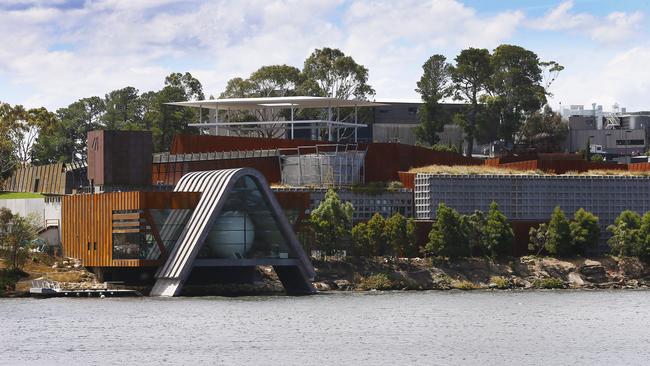
When asked if she was worried about tempers flaring and arguments boiling over at the congress, Kaechele concedes that “there’s certainly reason, at first glance, to be concerned”.
“We did face many moments with delegates where someone said, ‘Oh, if that person is in the room, I can’t come, I won’t be attending’,” she says.
“And yet everyone has managed to get through those initial reactions. And I think that our team has been very careful in curating the panels, the sessions, and the working groups, with expert facilitators, so that the chemistry has been considered and people with intense past hurts are not set up to be confronted in a direct and difficult way.”
Nick Steel, the CEO of the Tasmanian Forest Products Association, which is the state’s peak forestry industry body, will be attending the congress as a delegate and said he recognised “the long and complicated conversations that have taken place in the past and … at times [the industry] could have done things better”.
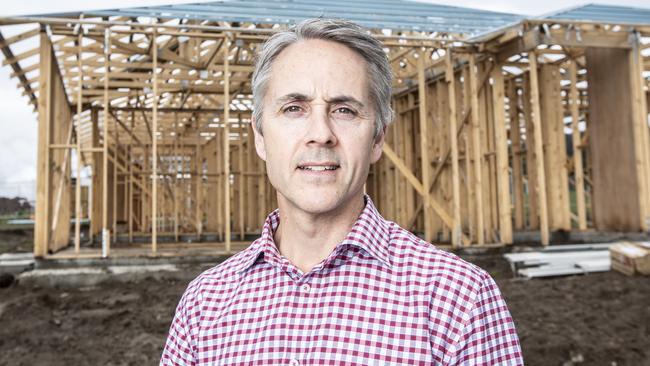
“But today we’re a modern industry, which is committed to protecting not only the economy, but also the environment, and the thousands of Tasmanians who rely on our industry in every part of our state,” he said.
In 2021, a landmark review of the economics of biodiversity by Professor Sir Partha Dasgupta, commissioned by the UK Treasury, concluded that nature’s worth to society was “not reflected in market prices because much of it is open to all at no monetary charge”.
“These pricing distortions have led us to invest relatively more in other assets, such as produced capital, and underinvest in our natural assets,” the review states.
Kaechele says her definition of value encompasses economics but also transcends dollars and cents.
“You can’t ask the question without considering [the forest’s] value to communities and its value beyond economics,” she says.
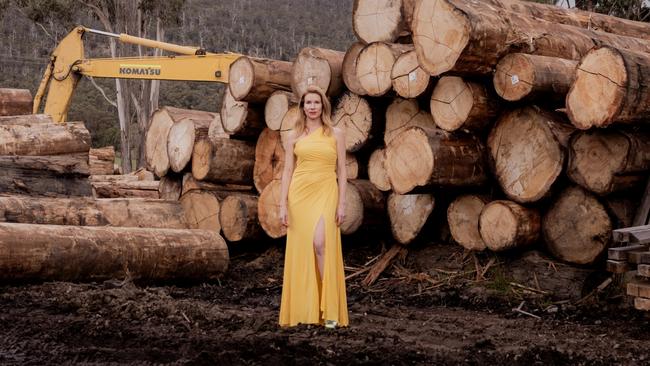
So what would it ultimately take for Kaechele to deem her enormously ambitious undertaking a success?
Firstly, she wants to see agreement on the definition of terms like ‘native forest’ and ‘old growth’ and for the congress to reach an understanding of the true value of Tasmanian forests and how communities can enjoy their benefits.
Kaechele’s “dream scenario”, she says, is for a “road map” to be developed for valuing forests, as well as a list of recommendations that could be provided to the state government.
“Wish us luck!” she says with enthusiasm and a barely perceptible hint of trepidation.
More Coverage
Originally published as Kirsha Kaechele planning future events after ‘raging success’ of Mona’s Forest Economics Congress




